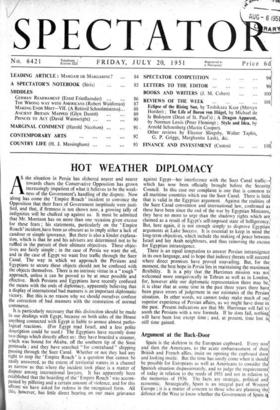HOT WEATHER DIPLOMACY
ASthe situation in Persia has slithered nearer and nearer towards chaos the Conservative Opposition has grown increasingly impatient of what it believes to be the weak- ness of the Government's handling of the dispute. Now along has come the ' Empire Roach ' incident to convince the Opposition that their fears of Government ineptitude were justi- fied, and that, if firmness is not shown now, a growing tally of indignities will be chalked up against us. It must be admitted that Mr. Morrison has on more than one occasion given excuse for these fears ; his statements, particularly on the ' Empire Roach incident, have been so obscure as to imply either a lack of candour or simple ignorance. But there is -also a kinder explana- tion, which is that he and his advisers are determined not to be ruffled in the pursuit of their ultimate objectives. These objec- tives are fairly simple ; in the case of Persia we want the oil, and in the case of Egypt we want free traffic through the Suez Canal. The way in which we approach the Persians and Egyptians to secure these objects should not be confused with the objects themselves. There is no intrinsic virtue in a " tough " approach, unless it can be proved to be at once possible and effective. Both Persians and Egyptians have recently confused the means with the ends of diplomacy, apparently believing that a display of international bad manners is an important diplomatic victory. But this is no reason why we should ourselves confuse the correction of bid manners with the restoration of normal commerce.
It is particularly necessary that this distinction should be made in our dealings with Egypt, because on both sides of the House anything connected with Egypt is liable to arouse almost patho- logical reactions. (For Egypt read Israel, and a less polite description could be used.) The Egyptians have recently done two things which directly affect us: they have boarded a steamer, which was bound for dkkaba, off the southern tip of the Sinai peninsula ; and they have searched 6' for contraband " shipping passing through the Suez Canal. Whether or not they had any right to stop the ' Empire Roach' is a question that cannot be easily answered, as the extent of territorial waters in a channel as narrow as that where the incident took place is a matter of dispute among international lawyers. It has apparently been established that the boatiling of the ' Empire Roach' was accom- panied by pilfering and a certain amount of violence, and for this affront we have asked for redress in the recognised form. All this, however, has little direct bearing on our main grievance against Egypt—her interference with the Suez Canal traffi– which has now been officially brought before the Securityi Council. In this case our complaint is one that is common to all maritime countries which use the Suez Canal. There is little; that is valid in the Egyptian argument. Against the realities of the Suez Canal convention and international law, confirmed- as • these have been since the end of the war by Egyptian Ministers,) they have no more to urge than the shadowy rights which are' claimed as a result of Egypt's self-imposed state of belligerency:I, But, here again, it is not enough simply to disprove Egyptian arguments at Lake Success. It is essential to keep in mind the long-term objectives, which include the making of peace between Israel and her Arab neighbours, and thus removing the excuse for Egyptian intransigence. . There is an equal temptation to answer Persian intransigence in its own language, and to hope that indirect threats will succeed where direct promises have proved unavailing. But, for the, moment, the best hope in Persia lies in maintaining the maximum flexibility. It is a pity that the Harriman mission was not' welcomed more unequivocally in Tehran as well as in London,1 for, however able our diplomatic representation there may be,1 it is clear that at some time in the past three years there have been grave errors of judgement in our estimates of the Persian situation. In other words, we cannot today make much of ours superior experience of Persian affairs, as we might have done in the past. Present indications are that Mr. Harriman will fail tot sooth the Persians with a new formula. If he does fail, nothing will have been lost except time ; and, at present, time lost is still time gained.


































